 Petzlover
Petzlover Portuguese Water Dog is originated from Portugal but Ratonero Bodeguero Andaluz is originated from Spain. Portuguese Water Dog may grow 14 cm / 6 inches higher than Ratonero Bodeguero Andaluz. Portuguese Water Dog may weigh 18 kg / 40 pounds more than Ratonero Bodeguero Andaluz. Portuguese Water Dog may live 3 years less than Ratonero Bodeguero Andaluz. Both Portuguese Water Dog and Ratonero Bodeguero Andaluz has almost same litter size. Both Portuguese Water Dog and Ratonero Bodeguero Andaluz requires Low Maintenance.
Portuguese Water Dog is originated from Portugal but Ratonero Bodeguero Andaluz is originated from Spain. Portuguese Water Dog may grow 14 cm / 6 inches higher than Ratonero Bodeguero Andaluz. Portuguese Water Dog may weigh 18 kg / 40 pounds more than Ratonero Bodeguero Andaluz. Portuguese Water Dog may live 3 years less than Ratonero Bodeguero Andaluz. Both Portuguese Water Dog and Ratonero Bodeguero Andaluz has almost same litter size. Both Portuguese Water Dog and Ratonero Bodeguero Andaluz requires Low Maintenance.
 The Portuguese Water Dog is a working dog hailing from the Portuguese region of the Algarve. The dog has always been a friend of the sea, working around fishing boats, loving his life around water.
The Portuguese Water Dog is a working dog hailing from the Portuguese region of the Algarve. The dog has always been a friend of the sea, working around fishing boats, loving his life around water.
He descends from dogs that have always been used by Portuguese fishermen, and its believed he has Poodle in him. Known also as the Cao de Agua, which means Dog of the Water, the Portie as he is also known, almost disappeared.
Their numbers dropped in the early 20th century, but a certain Vasco Bensuade saved the breed, forming a breed club, writing a breed standard.
They then also made their way to England and the United States. It was in 1972 that the Portuguese Water Dog Club of America formed. In 1983, the AKC recognized the dog as a distinct breed.
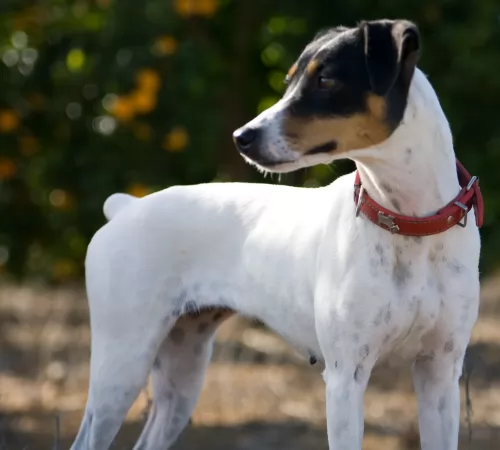 Long ago the English visited Spain to sample their wines, bringing with them smooth coated English Fox Terriers which were later crossed with other dog breeds of the area.
Long ago the English visited Spain to sample their wines, bringing with them smooth coated English Fox Terriers which were later crossed with other dog breeds of the area.
It is believed that the Andalusia Ratter’s ancestors were smooth coated fox terriers. The Club Nacional del Perro Andaluz Ratonero Bodeguero was established and in 1993 a standard for the breed was set.
It is only fairly recently that the breed was recognized by the Royal Canine Society of Spain but it isn’t recognized by any of the major kennel clubs.
 Standing at between 43 and 57cm in height and weighing in the region of 16 to 27kg, the Portuguese Water Dog is a medium-sized, curly-coated dog.
Standing at between 43 and 57cm in height and weighing in the region of 16 to 27kg, the Portuguese Water Dog is a medium-sized, curly-coated dog.
It is believed that the dog is hypoallergenic. He does however shed, though not a lot. He just loves the water and is always ready to plunge in. One of the distinctive characteristics of this dog is its webbed feet.
The Portuguese Water Dog is an intelligent dog that will do well with training and socialization.
It won’t be troublesome training this dog as he is intelligent. They're also calm dogs. Referred to fondly as the Portie, this is a fun-loving dog, friendly and social, getting on well with all members of his human family.
These dogs get on well with children and other family pets. They can be reserved toward strangers, but this makes them good watchdogs.
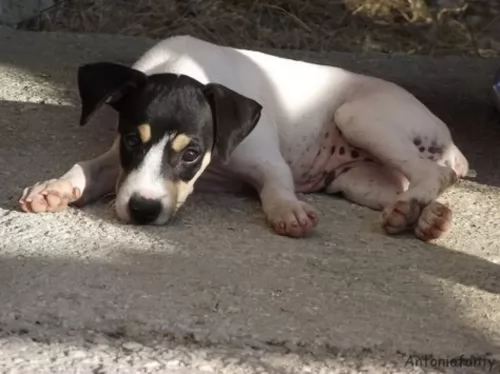 Also known as the Spanish Jack Russell, the Ratonero Bodeguero Andaluz looks very similar to this popular Jack Russell Terrier.
Also known as the Spanish Jack Russell, the Ratonero Bodeguero Andaluz looks very similar to this popular Jack Russell Terrier.
He is a small to medium sized dog with a lean, muscular body. The Ratonero developed in the south of Spain and is thought to be a mix of local ratting dogs and Fox Terriers. This ensured a quick, agile hunter.
The dog stands at between 35 – 43cm in height and weighs 6 - 9kg. The dog’s head is fairly small with dark brown eyes and half erect-half floppy ears. The coat is mainly white with some freckling. It is short and smooth with shades of black and tan covering the facial area. Some of these dogs are born with a natural bob-tail.
These dogs are known to have robust, hearty, happy personalities, full of the joys of living. They get on well with children as well as other pets if they have grown up with them.
Introductions should be slow if one of these dogs are brought into a home where there are already other pets. He is a very active breed and will be requiring plenty of mental stimulation and physical exercise.
They can provide quite a bit of entertainment for their human families as they can become quite clownish. They’re the kind of dogs that can adapt to life in the countryside or the city.
 With training, your Portie can make a splendid pet. He is also adaptable to different living situations, and is capable of living in the city or in the countryside, just so long as his exercise needs are met.
With training, your Portie can make a splendid pet. He is also adaptable to different living situations, and is capable of living in the city or in the countryside, just so long as his exercise needs are met.
He is such an affectionate and loyal, fun-loving dog while also being hard working, and all these wonderful characteristics mean that he can be a treasured pet and companion.
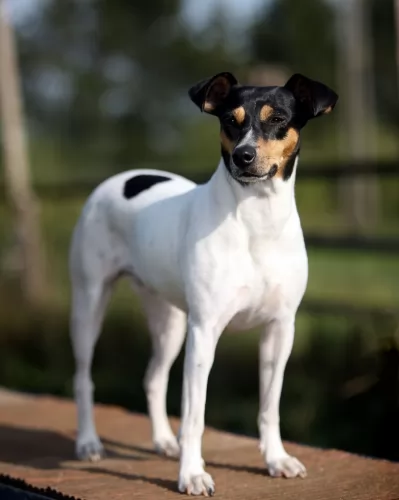 Your Ratonero Bodeguero Andaluz to this day is a ratter, always alert and ready to spring on prey. He is always lively and friendly, and with his loving nature, makes a splendid companion for his human family.
Your Ratonero Bodeguero Andaluz to this day is a ratter, always alert and ready to spring on prey. He is always lively and friendly, and with his loving nature, makes a splendid companion for his human family.
He is also a stubborn dog, liking to go his own way, and therefore will require training and socialization. He is an adaptable little dog too and when you bring him into your home he is willing to adapt to your way of life and become a loyal and loving member of your family.
 Portuguese Water Dogs are generally healthy, but like most other dogs they are more prone to certain heath conditions, though your pet is unlikely to get any of them. Still it pays to know of some of the more complicated- and disabling ones.
Portuguese Water Dogs are generally healthy, but like most other dogs they are more prone to certain heath conditions, though your pet is unlikely to get any of them. Still it pays to know of some of the more complicated- and disabling ones.
This is where the thighbone doesn't fit properly into the hip joint. Hip dysplasia spells pain for your dog and he may show lameness with one or both rear legs. Arthritis can develop too.
Hip dysplasia is hereditary, but it can be worsened by allowing your dog to become obese and from injuries from leaping off your bed for instance.
This is a degenerative eye disorder that can lead to blindness, but fortunately it is detectable long before the dog shows signs of blindness.
Reputable breeders have the eyes of their dog certified each year by a veterinary ophthalmologist and they don’t allow the dogs to produce puppies.
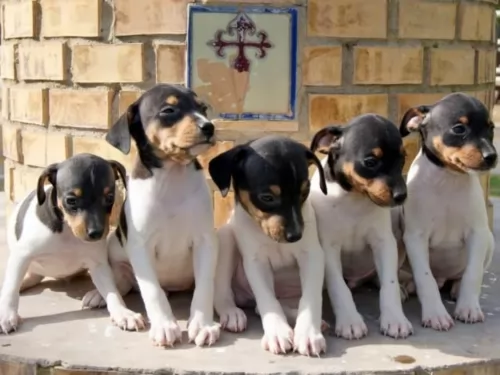 With good care, your Andalusian Ratter isn’t likely to get sick, but still, you would be better off knowing about some of the common dog diseases your pet could get.
With good care, your Andalusian Ratter isn’t likely to get sick, but still, you would be better off knowing about some of the common dog diseases your pet could get.
This is usually seen in young dogs where there is lameness in the hind legs and hip pain. It is believed that Legge Perthe’s occurs because of a genetic predisposition, and when it develops, there is sadly no cure.
Skin infections may seem fairly mild but nothing can be further from the truth. They can be painful and frustrating. Skin redness, dryness, itchiness and pain can cause your pet to lick and bite and make the situation worse. If your pet is being driven crazy by a skin irritation, get him to the vet who will do a complete physical examination.
Other diseases to be aware of include hip dysplasia, obesity, epilepsy and bloat.
 Your Portie is a dog that loves outdoor life and lots of exercise. Take him with you on your walks and give him a run off his leash. When he gets home, if you have a pool h’ll be the first to plunge right in. He makes a great pet to have at the sea too.
Your Portie is a dog that loves outdoor life and lots of exercise. Take him with you on your walks and give him a run off his leash. When he gets home, if you have a pool h’ll be the first to plunge right in. He makes a great pet to have at the sea too.
Provide him with plenty of nice chewy toys, balls and ropes so he doesn’t get bored.
Provide him with a nice, dry, warm sleeping area and don’t allow him to be disturbed when he retreats there.
Keep his vaccines up to date to prevent some life threatening illnesses.
Provide him with high quality food that has lots of vitamins and minerals instead of fillers, preservatives, colorants and toxins.
There are some excellent commercially manufactured dog foods which can be convenient and good for your pet. Try and provide him with some tasty homemade food occasionally. Nothing spicy and exotic. Dogs thrive on simplicity and consistency.
Boiled chicken, brown rice or pasta, carrots, spinach and sweet potatoes chopped up and added twice week to the dry kibble is all your dog requires to keep him energetic happy, thankful, healthy and happy.
A little bit of raw meat added in from time to time will be superb. See that he always has access to clean, cool water.
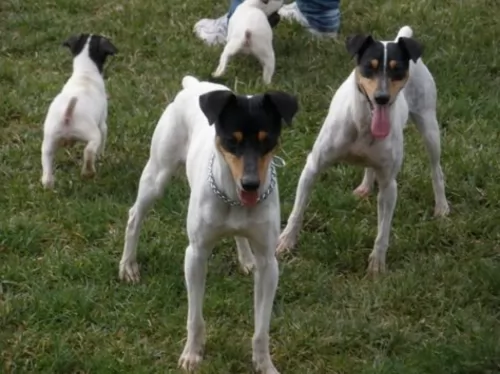 This is a fairly low maintenance dog as the short smooth coat will be easy to brush twice a week.
This is a fairly low maintenance dog as the short smooth coat will be easy to brush twice a week.
Check him over for unusual lumps, trim his nails and check inside his ears, look into his eyes to ensure they are bright and alert and look inside his mouth to make sure he doesn’t have any rotten teeth.
Have your pet neutered or spayed if you want to avoid puppies. This can be beneficial for your pet’s health too.
Feed your Ratonero Bodeguero Andaluz only the best food there is. If you opt for commercially manufactured food, make sure its full of vitamins and minerals. Your little pet will want consistency and simplicity with his food to avoid digestive problems.
Try and provide him with some home-made food which can be added to the dry kibble twice a week as a treat. Boiled chicken, brown rice or pasta and spinach, sweet potatoes and carrots all chopped up ad mixed into the dry kibble will ensure your pet’s health.
Some raw meat added in occasionally will also go towards ensuring his good health.
Always make sure he has access to fresh, cool water.
Provide him with a safe, dry, warm, comfortable place to sleep.
Get him to the vet when you see he is sick.
Ensure he has sun and shade in the garden.
Never ever leave him in a hot car.